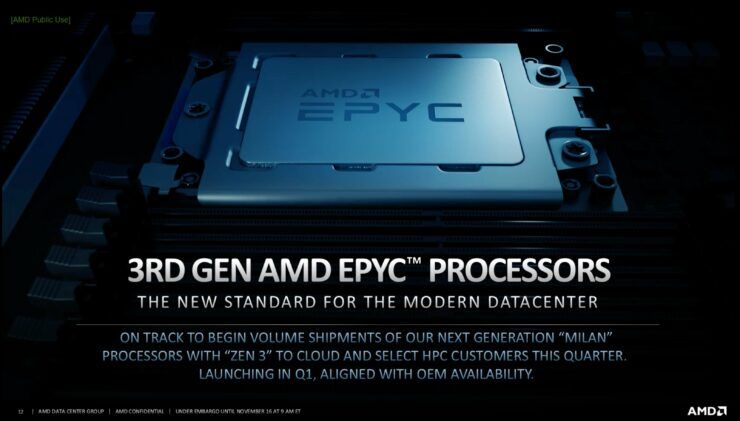There are totally fresh details about the new third-generation AMD EPYC Milan server processors, which are based on the Zen 3 core. The complete alignment seems to have been filtered out, along with performance tests that show the advancement over the second generation Rome.
List of third-generation EPYC Milan processors
In the performance tests, we can see how the EPYC 7713 chip performs, but it is not the fastest of the new “Milan” family. The top of this family would be the EPYC 7763
Meanwhile, the EPYC 7713 operates at a base clock of 2.00 GHz but goes up to 3.7 GHz. This allows it to lower the default TDP by 225W, instead of the 280W of the 7763. Both occupy 256 MB of L3 cache and 32 MB of L2 cache.
| CPU NAME | CORES / WIRE | CLOCK | BOOST CLOCK | CACHE L3 | CACHE L2 | TDP |
|---|---|---|---|---|---|---|
| AMD EPYC 7763 | 64/128 | 2.45 GHz | 3.50 GHz | 256 MB | 32 MB | 280W |
| AMD EPYC 7663 | TBA | TBA | TBA | TBA | TBA | TBA |
| AMD EPYC 7713 | 64/128 | 2.00 GHz | 3.70 GHz | 256 MB | 32 MB | 225W |
| AMD EPYC 75F3 | 32/64 | 2.95 GHz | 4.00 GHz | 256 MB | 32 MB | 280W |
| AMD EPYC 7443 | TBA | TBA | TBA | TBA | TBA | TBA |
| AMD EPYC 74F3 | 24/48? | TBA | TBA | TBA | TBA | TBA |
| AMD EPYC 7413 | 24/48 | 2.65 GHz | 3.60 GHz | 128 MB | 16 MB | 180W |
| AMD EPYC 7313 | 16/32 | 3.00 GHz | 3.70 GHz | 128 MB | 16 MB | 155W |
| AMD EPYC 72F3 | TBA | TBA | TBA | TBA | TBA | TBA |
In the tests, the EPYC 7713 was measured with a 64-core EPYC Rome chip. In the IPC, both were locked at 2.4 GHz and the Milan chip was 14% faster. At 3.7 GHz, the advantage increased to 27%.
In the multithreading tests, the AMD EPYC 7713 achieved a 10% performance increase with Boost enabled.
In Cinebench R23, the EPYC 7713 scored 87878 points in the multi-core tests and 1215 points in the single-core tests. Compared to other chips, it is 76% faster than the Intel Xeon 8280L Cascade Lake-SP. On a single-core, the EPYC Milan beats the Cascade Lake-SP chip by 20%+.
Soon, the Xeon ‘Cascade Lake-SP’ will be replaced by the Ice Lake-SP, which will increase its cores to 36. However, these tests show that AMD will continue to lead thanks to Milan unless Intel can improve performance by more than 20% on IPCs, which would be surprising. That’s Intel’s only hope since it can’t compete on core count. We’ll keep you posted on the latest.
